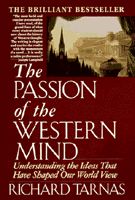
|
 |
The Passion of the Western Mind : Understanding the Ideas That Have Shaped Our World View Richard Tarnas 
Format: Paperback, 000pp. ISBN: 9780345368096 Publisher: Ballantine Books Pub. Date: April 1993 Average Customer Review: For Bulk Orders Call: 626-441-2024 Description and Reviews From The Publisher: Here are the great minds of Western civilization and their pivotal ideas, from Plato to Hegel, from Augustine to Nietzsche, from Copernicus to Freud. Richard Tarnas performs the near-miracle of describing profound philosophical concepts simply but without simplifying them. Ten years in the making and already hailed as a classic, The Passion of the Western Mind is truly a complete liberal education in a single volume. Reviews "[This] magnificent critical survey, with its inherent respect for both the 'Westt's mainstream high culture' and the 'radically changing world' of the 1990s, offers a new breakthrough for lay and scholarly readers alike....Allows readers to grasp the big picture of Western culture for the first time." —San Francisco Chronicle
Table of Contents
Customer Reviews Write your own online review. Reviewer: Dr Brian Morris from London, UK Richard Tarnas has written an amazingly lucid, comprehensive and analytic account of the development of the way in which thinking in the West has evolved over millenia. Tarnas identifies brilliantly the bifurcations and break-points in the thinking processes and the ideas espoused by the Western Mind. This text is not a cook-book, rather it is an educational privilege to read Tarnas thinking and analysis. The fundamental tension running through the text is between mans independence from the world (his dreams, hopes and fears) and his dependence on a physical universe that is indifferent to him (his needs for physical well being: food, warmth, community). An example, where the reason v faith dichotomy is reassessed by the Romantics in the nineteenth century, is as follows: The early modern dichotomy between secular science and the Christian religion, now became a more general schism between scientific rationalism on the one hand and the multifaceted Romantic humanistic culture on the other, with the latter now including a diversity of religious and philosophical perspectives loosely allied with the literary and artistic tradition. In this way modern man has an inner culture of art, literature and religion while at the same time having an outer culture of nature, the cosmos and the limits of what it is possible to know. Everywhere man finds himself free, but bounded, in a new set of double truths: inner-outer, subject-object, man-world, humanities-science. In short man became divided within and without. As Tarnas says Modern man was a divided animal, inexplicably self-aware in an indifferent universe. And so man has become trapped in a world of his own ideas and making. Tarnas says: The crisis of modern man is an essentially masculine crisis. It is at this point he suggests a surprising way forward. He points away from the masculine, and towards the feminine. He suggests the greatest passion of the western mind has been to reunite with the ground of its own being. In short to come to terms with the great feminine principal in life which preserves human autonomy, while also transcending human alienation. Tarnas ends with an intriguing question: why has the pervasive masculinity of the Western intellectual and spiritual tradition suddenly become so apparent to us today, while it remained so invisible to almost every previous generation? His answer follows Hegel a civilization cannot become conscious of itself, cannot recognize its own significance, until it is so mature that it is approaching its own death. And so is this the point of nuclear power, mutually assured destruction, global warming, AIDS and the pernicious influence of globalisation? That we are becoming aware of our death and are becoming ready to reunite with the ground of our being. Perhaps, after all, there is a deeper meaning to the story about the Tree of Life and The Tree of Knowledge. Find Items On Similar Subjects |
|

The Essential Lists BOOKS TO READ BEFORE YOU LEAD 
Grow Your Leadership Skills NEW AND UPCOMING LEADERSHIP BOOKS 
Classic Leadership Books BOOKS TO READ BEFORE YOU LEAD |
 |
| ||
 | © 2019 LeadershipNow™ All materials contained in https://www.LeadershipNow.com are protected by copyright and trademark laws and may not be used for any purpose whatsoever other than private, non-commercial viewing purposes. Derivative works and other unauthorized copying or use of stills, video footage, text or graphics is expressly prohibited. |
||